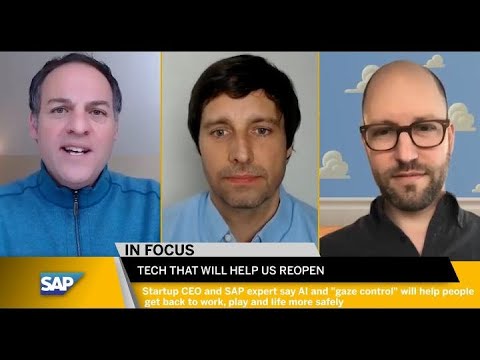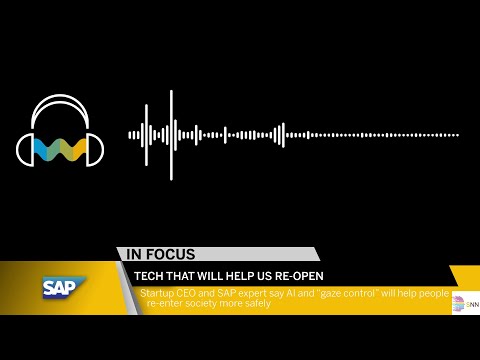Recent projections by the U.S. federal government estimate that there will be 200,000 new cases of coronavirus in the country by June 1. At the same time, governments around the world are grappling with the complexities of safely reopening businesses, schools, and other public institutions.
Technology companies are rushing into that gap with software aimed at keeping people safe as citizens navigate a patchwork approach to easing shelter-in-place orders. One well-known approach is the use of contact-tracing apps on smartphones created by technology and telecommunications companies. These apps alert people if they have been in close proximity to an infected person.
Other technologies can help. When businesses and other institutions reopen, they will need to do many things differently. A new technology called gaze control allows people to avoid touching surfaces, like ATM display screens or subway-fare vending machines, that may be potentially contaminated with the virus.
Stephan Odörfer is founder and managing director of Munich-based 4tiitoo, pronounced “42,” a startup that creates gaze control technology. Put simply, the technology lets people use their eyes to interact with computers, replacing the need to touch a keyboard, mouse, or screen.

4tiitoo has combined gaze control with artificial intelligence (AI) to analyze patterns in users’ eye movement and predict what people want to do next within a particular computer screen or application.
“Gaze control allows you to do two things: It controls the computer and we can use it to get an understanding of what the user actually wants to do,” Odörfer said. “By understanding intention, we can proactively support him.”
For example, 4tiitoo technology called NUIA learns how a user reads and operates a data-entry form. With this information and the users’ gaze position, the solution automatically “clicks” to the next field without the need to touch the mouse to navigate. This solution is also integrated with voice technology, so workers can dictate information directly into data fields rather than typing it.
There are countless applications of hands-free technology in a post-COVID-19 world.
Manufacturers’ employees, who are especially vulnerable, can benefit. 4tiitoo participated in SAP.iO Foundries in 2018. Since then, the two companies have collaborated to help improve efficiency and ergonomics on factory floors and in offices. Those projects have taken on a new urgency and importance to safeguard workers’ health and safety as they return to production lines. With eye control, workers will not have to risk infection by removing protective gloves to type or spend countless hours sanitizing touch screens.
Health clinics and hospitals can also benefit. “You have a higher risk of infection, as more infected people are in these areas,” Odörfer said. “So controlling a touch screen device with your gaze to select what you want to do will help.” Because the solution is intuitive and easy to use, Odörfer hopes to avoid a steep learning curve, which typically slows widespread adoption of new technologies.
David Judge, vice president of Intelligent Enterprise Solutions at SAP, agrees. He believes the pandemic could hasten adoption of technologies like AI, blockchain, the Internet of Things (IoT), and machine learning.
Before the pandemic, Judge says that companies were dipping their toe in the water with these technologies that may prove critical in the recovery period.
“No longer is it around the edges. Now companies have to rethink their entire customer experience because they can no longer service them in the same way,” he said. “There are lots of interesting applications of these technologies, which are now being thought of in a new way and with more urgency.”
For example, sporting venues need to reconsider how they interact with audiences and manage the stadium environment. “We need to find new ways for people to enjoy such a public experience,” Judge said. “We’re going to have to have new procedures — new sensors, new ways of tracking people’s movements throughout that experience. Many companies wanted to do [this] before, but now we have this compelling event.”
These technologies tracking and collecting personal data raises privacy concerns. Based in Europe, 4tiitoo designed its products to comply with the European Union’s stringent General Data Protection Regulation (GDPR). But as Judge points out, contact tracing will collect personal health data. He thinks blockchain – as well as traditional data management and cybersecurity techniques – can help protect people’s data. Still, “it’ going to be a tough challenge to unwind,” he said.
But Judge remains bullish on accelerated adoption of intelligent technologies for two reasons. “First, [the pandemic is] going to be used to help make the transition from existing to future business models.” For example, call centers, where people sit closely together, will need to find safer ways to answer calls using intelligent technology, like chatbots. Second, businesses will look for ways to use data to make smarter, faster business decisions while automating and speeding up human-driven tasks.
“For both of those two ambitions, you’re just going to throw gas on the fire,” Judge shared.
Listen to the full interview:




